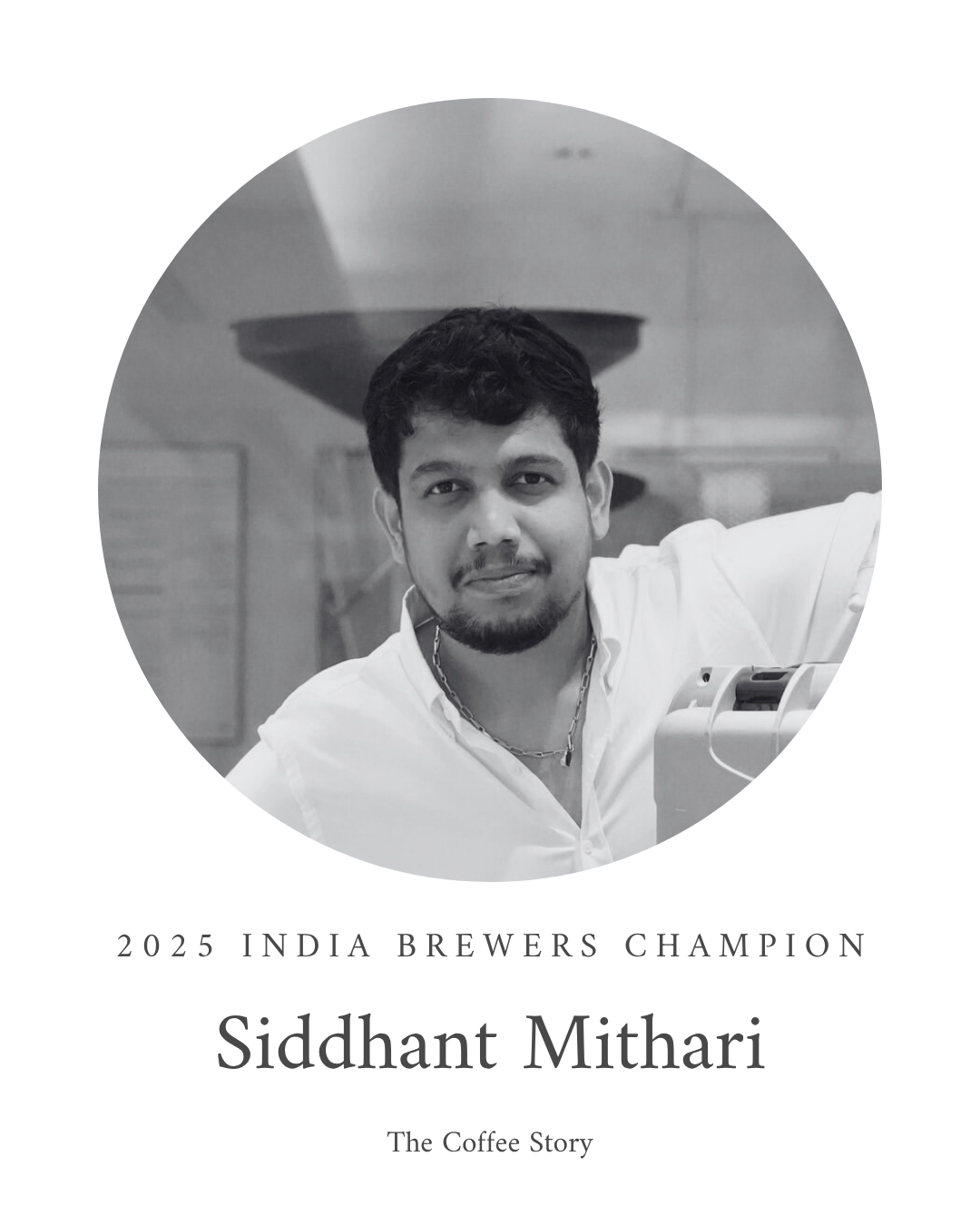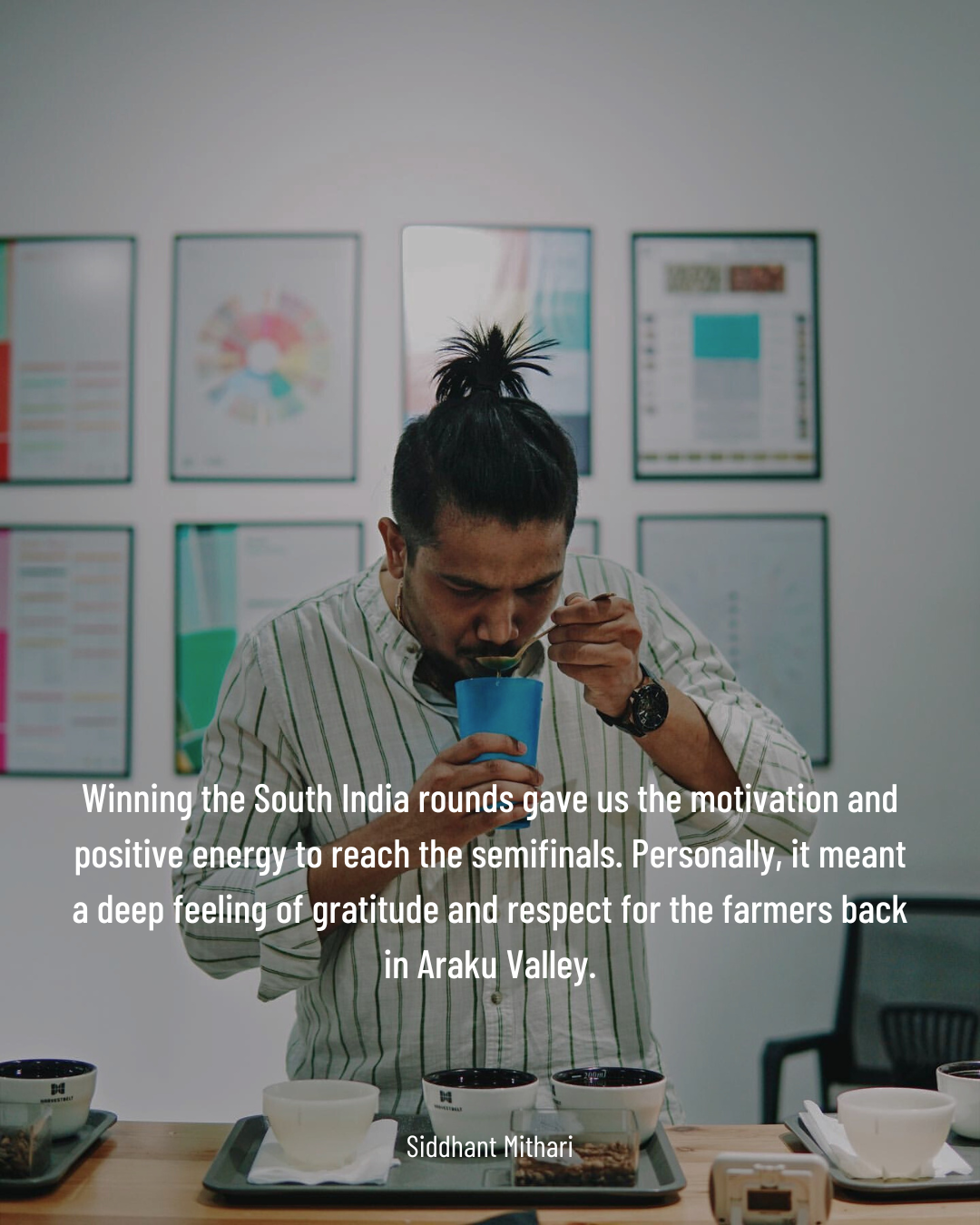India’s First Brewers Cup Champion on Culture, Coffee, and Competition
I first met Siddhant Mithari at a cupping event at Harvestbelt. He was quiet, focused, and always had a warm smile. He set up the cupping table confidently without needing help from anyone. It was clear he knew exactly what he was doing. That was my first impression of him.
He wasn’t just skilled, he was also one of the few people I met who was truly eager to grow and learn more. I still remember the day when he was really excited about moving to India. He didn’t share details but let me know that big things are coming.
A few months later, I found out that he had won the title of India’s first Brewers Cup Champion. I was surprised, but also knew right away. Here’s his story of the national stage, brewing philosophy, and vision for Indian coffee.
Personal Journey & Inspiration
Siddhant, congratulations on winning the National Brewers Cup in India! Was competing always on your radar, or was there a specific turning point that pushed you to take part?
Thank you, and I’m glad for this opportunity to share my journey, Naveed. Honestly speaking, I would have never gotten into competitions if I wasn’t part of the UAE’s specialty coffee culture. Moving to the UAE and being part of Harvestbelt inspired me. Seeing the whole spirit of competitions that took place in the UAE made me want to compete in the National Brewers Cup Championship in India. The inspiration has always been to represent India one day, and the Brewers Cup was something I had been waiting a long time to participate in.
What made you choose brewing over other competition categories like barista or roasting?
Every competition has its own spirit and challenges to explore. However, the Brewers Cup for me was like meditation. You can fail in many ways trying to achieve that calm state where everything else feels in sync. The struggle to reach that perfect balance where my brew, my story, and my techniques merge is what makes me feel complete. That desire to feel complete was the key reason I chose the Brewers Championship over other competitions.
What does winning the South India and national titles mean to you personally and professionally?
Winning the South India rounds pushed me into a phase of self-reflection, along with my team from Araku Coffee. It gave us the motivation and positive energy to reach the semifinals. At the same time, it worked as a mock drill that helped me improve my performance and precision for the finals. Personally, it meant a deep feeling of gratitude and respect for the farmers back in Araku Valley. It also strengthened the bond between me and my team for a greater purpose.
Becoming “India’s first Brewers Cup Champion,” even dreaming or manifesting it was a challenge. All I focused on was performing at my best and delivering the best possible performance. After receiving the title, I know now that the journey has just begun. The world stage awaits, and this title will be the fuel to aim for a global win for India in the coming years.
Do you have mentors or peers in the coffee world who have inspired or guided you along the way?
First things first, I’m blessed to have wonderful colleagues and friends at Araku Coffee who not only helped me prepare for my routine but also went the extra mile, judging my practice runs and guiding me to improve in every way.
Every National Brewer Cup competitor has been a mentor and inspiration to me. Throughout my career, friends from my specialty coffee journey in both India and the UAE have guided me, directly and indirectly.
Lastly, the enormous support I’ve received from our management in sourcing the best coffees from Araku Valley has been a huge help.
Brewing Philosophy & Routine
Walk us through your daily brewing routine. What does your personal ritual look like compared to your competition routine?
I truly believe that no coffee is badly roasted or processed. Most of the time, it’s the brewing that takes away its true character. Being involved in production and sourcing in the specialty coffee industry, I’ve made it a habit to taste every roast profile and find the best brew recipe for each one. This has helped me learn and observe every aspect of brewing with a Hario V60. Which means very little changed during the competition, as I was already brewing multiple times a day with different coffees. I just took it one step further by locking my brewing routine with a competition recipe and presentation.
Do you have a go-to recipe or ratio you fall back on when trying a new coffee?
My friend Vishnu and I, back in 2022, were really inspired by Matt Winton’s winning recipe. This is was a 1:15 coffee-to-water ratio with five equally split pours. This recipe works well with almost all coffees, giving you an optimal balance and complexity that does justice to the coffee.
What’s one brewing principle or tip you think every home or professional brewer should master?
I personally feel there are countless ways to explore brewing before it becomes a routine. Investing in the right equipment makes a huge difference, but more importantly, being open to exploring variables like grind size, water quality, temperature, and ratio can definitely improve your brew.
Understanding the processing and conducting sensory evaluations can help a brewer decide on the best grind size and coffee-to-water ratio.
One observation I’d like to share is when working with experimentally processed coffees, I’ve found that grinding them coarser than usual and reducing the water-to-coffee ratio often gives me a better cup.
Competition Deep Dive
Tell us about the coffee you used in the championship. How did you choose it? What’s the story behind the farm and its processing method?
Fortunately, working at Araku Coffee gave me the chance to showcase coffees grown in a non-traditional region of India. Araku Valley has a unique terroir, and farming there follows a holistic approach. My key motive in selecting my competition coffee was finding the sweetest cup profile.
We selected four single-farm natural coffees from the Araku Valley in Andhra Pradesh. The coffee from Pangi’s farm (a small, marginal tribal farmer) stood out for its sweetness. Grown at 1150 meters above sea level on a 0.4 hectare plot using regenerative organic farming, the cherries had a Brix level of 25+. We used an extended natural slow-drying process to break down sugars slowly. The result was a coffee with bright tropical fruit and berry notes and a long, lingering sweetness. It was perfect for the competition.
What was your core brewing strategy or “game plan” going into the competition?
Inspired by the slow natural drying process, my strategy was to limit thermal shock during roasting and brewing. This approach of reducing sudden temperature changes became my core game plan.
Were there any challenges during preparation or the competition that tested your skills or mindset?
The most challenging part was figuring out the ideal rest period after roasting when the coffee was at its peak in flavor. It became trickier as we added more brewing variables. It really tested our skills and mindset in estimating the synergy between roast development and brewing variables. Figuring it out was not only insightful but also a lot of fun!
India vs UAE – Coffee Culture & Community
You’ve worked closely with the coffee community in both India and the UAE. How would you describe the difference in culture, approach, and professionalism between the two?
One thing that’s often overlooked but common in both Indian and UAE coffee cultures is their “unity in diversity.” Taste preferences vary widely across regions and cultures, especially in the UAE. This diversity is common to both countries. But the UAE has the advantage of serving coffees from multiple origins, with equal appreciation from consumers, which makes it an extraordinary experience hub.
On the other hand, I’m always happy to see how specialty coffee is gaining mass acceptance in India, making it an exciting new playground for the specialty coffee movement.
What did your time in Dubai teach you about coffee, and how did it shape your path to the championship?
Dubai will always be like an open university for me. It was a blessing to be surrounded by international coffee professionals and exclusive coffees from around the world. Working with Harvestbelt, one of the best importers in the UAE, allowed me to interact with world champions and top competitors. They set new milestones and benchmarks that helped shape my competition journey.
What do you think both countries can learn from each other to push coffee forward?
I believe we’re already learning a lot from each other. I am not saying that we don’t value what’s growing in our own backyard, but the way the UAE celebrates coffee is something I feel is still missing in India.
Given the chance, the UAE community should look beyond the historical stereotypes of Indian coffee and truly recognize the potential and efforts of Indian coffee producers. And it’s already happening and I’m confident the pace will accelerate as time goes by.
Looking Forward
What’s your vision for your role in India’s coffee movement going forward?
The vision from the start has been to showcase the talent and value of Indian coffee on the global stage. The goal is to gain global recognition for Indian specialty coffee and talent. The journey has just begun, and I have no plans of stopping until the Indian flag reaches the finals.
This interview has been edited and condensed for clarity.










